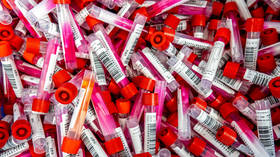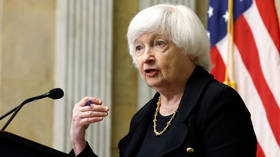Prizes for all (paying customers): Why 4 in 5 UK students now get a top degree

Once again, there is an outcry about the inflation of grades in the English University system. Almost eighty percent of students graduate with a first or a 2.1. degree – the top two grades.
Like previous secretaries of education, the present occupant of this post, Gavin Williamson, has vowed to put an end to the ‘continuous drift’ of grade inflation.
Unfortunately, the devaluation of a university degree cannot be stopped as long as universities continue to operate as businesses that treat students as customers. When higher education establishments have to keep their customers satisfied, grade inflation will continue. For what better way of ensuring that students are satisfied and happy then by offering them high grades?
Also on rt.com Plan to pay UK students £9/hr to snoop on each other’s ‘microaggressions’ is proof universities are vanguard of totalitarianismApologists for the current system often claim that the reason why more and more students are getting higher marks is because the system of higher education has improved and students are working harder. A spokesman for Universities UK, the body representing universities, stated that “students are working harder and improvements in teaching and investment in academic support and widening participation initiatives are also leading to legitimate grade improvements.”
In reality there is nothing ‘legitimate’ about constant grade improvements. The reason why grades are rising is because university administrators are continually lowering the bar and making it easier for students to get the top marks. Academics are under constant pressure to adopt what is euphemistically referred-to as “positive marking.”
As someone who has spent most of his professional life in academe, I have witnessed this process first-hand.
I still remember when I was criticised by an external course evaluator for not giving any of my students a ‘First’. The evaluator insisted that it was ‘good practice’ to reward students generously. He more or less insinuated that if no student gets a First in the final exam there must be something wrong with the course and, by implication, with its academic convenor.
Other colleagues have had similar experiences. Any academic with a reputation for taking the marking of papers and exams too seriously soon comes under pressure from their managers, who will demand that they ‘mark more progressively.’
Mollycoddling grown adults
Of course, this is not a process that happens in isolation from wider social trends.
The current system of grading is dominated by a culture of positive reinforcement that more or less dictates that everyone is a winner.
Academics are supposed to ‘validate’ students, which is another word for flattering them. Universities are under great pressure from Government and campaigning groups to look after the mental health and well-being of their students. With the pressure of work and the stress of writing exams rebranded as a risk to mental health, it is not surprising that universities will do what they can to ensure that their students do not feel too uncomfortable. Generously providing them with high grades is one way of insulating students from the pain of disappointment and failure.
Again, the transformation of the grading system into a medium of positive reinforcement is driven by the commercialisation of higher education and the imperative of consumerism that dominates campus life. Universities are now obliged to publish annual student satisfaction surveys and institutions have strong incentive to avoid the appearance of failing to satisfy their students.
The subordination of the Academy to the imperative of cultivating student satisfaction invariably leads to a role reversal between the authority of the academic and that of the student. When it comes to the measurement of the quality of student experience, what counts is not the judgement of an academic but the opinion of a student. In such circumstances, the question of “what do students want?” frequently trumps that of “what do students need?”.
What students ‘need’ –of course– is a top degree, and there is no better way of gaining students’ satisfaction and scoring well on the survey than by adopting the practice of ‘progressive marking.’
Happy but ignorant
In the end no one really benefits from an erosion of academic standards. With almost 80 percent of undergraduates now being awarded either a first or an upper-second-class degree, it is difficult to distinguish the outstanding student from the very average.
It was far easier to evaluate the value of a university degree in the 1980s, when most students gained a lower second, and only a fifth achieved a first or better.
Also on rt.com British uni students to examine ‘censored, gay, feminist, amateur’ PORN as part of ‘illuminating’ X-rated courseIn those days, someone with a first degree was regarded as an outstanding student. Today, a first degree has lost some of its exceptional status.
Many academics believe that the devaluation of a university degree is no big deal. They take the view that the dilution of a degree is a small price for ensuring that students feel good about themselves.
In reality, it is the students who lose out. Undergraduates who know that they can gain an upper second in their sleep are unlikely to stretch themselves in the lecture room and, therefore, have little incentive to work to realise their full potential. The average student loses a chance to do a bit better, and the gifted ones are discouraged from giving their best. That is a bad result for our society, no matter how many proud parents there are at the graduation ceremony.
Like this story? Share it with a friend!
The statements, views and opinions expressed in this column are solely those of the author and do not necessarily represent those of RT.















